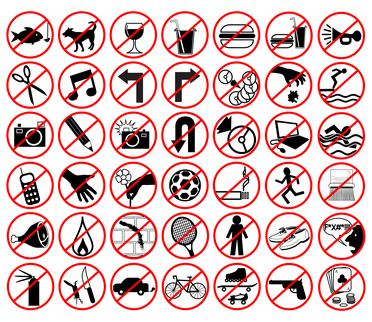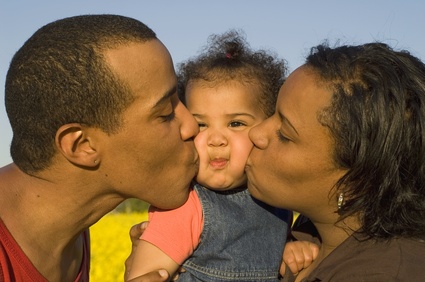Relationships Rule
Some people seem to think that rules make the child. When children begin to  misbehave, they slap on more rules to pull them back in line. They believe that the more children misbehave, the more rules they need to make them behave. Don’t get me wrong, rules are important. However, effective parenting does not begin with making more rules, but by forming a stronger relationship with your children. The stronger your relationship with your children, the more readily they will listen and obey…the more effective your parenting. Rather than need more rules, misbehaving children often need their parents to “lean into the relationship” while upholding the rules already in place. Children need relationship as much as they need structure. Josh McDowell even devised a formula for this: “Rules without relationship equals rebellion.”
misbehave, they slap on more rules to pull them back in line. They believe that the more children misbehave, the more rules they need to make them behave. Don’t get me wrong, rules are important. However, effective parenting does not begin with making more rules, but by forming a stronger relationship with your children. The stronger your relationship with your children, the more readily they will listen and obey…the more effective your parenting. Rather than need more rules, misbehaving children often need their parents to “lean into the relationship” while upholding the rules already in place. Children need relationship as much as they need structure. Josh McDowell even devised a formula for this: “Rules without relationship equals rebellion.”
 misbehave, they slap on more rules to pull them back in line. They believe that the more children misbehave, the more rules they need to make them behave. Don’t get me wrong, rules are important. However, effective parenting does not begin with making more rules, but by forming a stronger relationship with your children. The stronger your relationship with your children, the more readily they will listen and obey…the more effective your parenting. Rather than need more rules, misbehaving children often need their parents to “lean into the relationship” while upholding the rules already in place. Children need relationship as much as they need structure. Josh McDowell even devised a formula for this: “Rules without relationship equals rebellion.”
misbehave, they slap on more rules to pull them back in line. They believe that the more children misbehave, the more rules they need to make them behave. Don’t get me wrong, rules are important. However, effective parenting does not begin with making more rules, but by forming a stronger relationship with your children. The stronger your relationship with your children, the more readily they will listen and obey…the more effective your parenting. Rather than need more rules, misbehaving children often need their parents to “lean into the relationship” while upholding the rules already in place. Children need relationship as much as they need structure. Josh McDowell even devised a formula for this: “Rules without relationship equals rebellion.” Brain science actually lends support to this concept. Our brains adapt to the environment around them. An environment filled with loving, positive relationships produces brains that know how to trust others and show consideration to others. An environment filled with yelling, anger, and conflict produces brains that feel the need to defend, strike first to protect, or avoid. Which do you want your children to develop? One results in a person geared toward relational, and thereby overall, success. The other contributes to a defensive, fearful person…not a person geared toward long-term relational success.
How can we work to develop a positive relationship with our children? Here are five ways to help you begin.
1.Start young. Begin spending time with your child immediately. Talk to them, play with them, eat with them, and enjoy time with them. Invest time and energy in your child as soon as you know you or your spouse is pregnant. If your child is already a teen, don’t worry. It is never too late to start. Begin to spend time with them now. Learn about their interests and talk to them about their dreams.
2.Do things with your child. Take them to a concert of their choosing. Sure, the music is loud and you may not like it, but your child will always remember your willingness to spend time at a concert they liked. I remember my father playing Frisbee with me. I never thought much about it until I grew older and realized he is legally blind. Suddenly, it made sense that Frisbee color, background colors, and cloudy skies mattered. Each of these aspects helped him see the Frisbee. I look back on those times of Frisbee with great joy, even more so as I’ve matured and realized the effort he invested in playing. You can play a game, play catch, have a snowball battle, teach them something they might like, let them teach you something, eat together, or simply sit down to talk. Do a variety of things and do them often.
3.Listen to your child. When they are babies, listen to learn which sounds signal distress, which sounds express joy, and which sounds are just sounds. As your child gets older, listen to what they say. Listen to their questions and listen to their assumptions. You can learn so much about your child just by listening. And, your child learns that their thoughts are valuable to you. If they see you value their thoughts, they know you value them.
4.After you have listened, dialogue. Don’t lecture, jump in with your own solutions, or pontificate on your own opinions. Have a dialogue. I struggle with this one. Sometimes, I just want to tell my daughters the answer. I have more experience than they do and a better idea about what is best for them. But, I have learned that jumping in too soon means they won’t listen well. When I talk with them, allowing them to think and offering soft answers and points for them to consider, they becomes much more  receptive. I wager your children will, too. So, converse with your children.
receptive. I wager your children will, too. So, converse with your children.
 receptive. I wager your children will, too. So, converse with your children.
receptive. I wager your children will, too. So, converse with your children. 5.Hug your child. Touch communicates love. Hug your child good morning. Hug your child when one of you leaves for the day. Hug your child when you greet one another after time apart. Hug your child goodnight. When you sit down to watch TV, put your arm around your child. When you stand together, put a hand on their shoulder. I still remember my grandfather walking with his arm around my shoulder and the security I felt with his hand on my shoulder.Touch communicates safety, love, security, and honor. Give your child a hug.
I’m sure you can think of more ways to develop your relationship with your child. Share them in the comment section below so we can all have more ways to build our relationship with our children. After all, the stronger our relationship, the more effective our parenting.